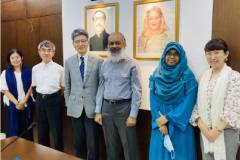The Relationship Dynamics Between China and the Smaller States: Field Study in Bangladesh
2023.01.24
JICA Ogata Sadako Research Institute for Peace and Development (JICA Ogata Research Institute) Executive Director Takahara Akio, Visiting Fellow Shiga Hiroaki (Professor at Yokohama National University), Research Fellow Asada Ray, and Research Officer Imai Natsuko traveled to Bangladesh and Thailand from Aug. 21 to 28, 2022, as part of the "The New Dynamics of Peace and Development in the Indo-Pacific: How Countries in the Region Proactively Interact with China" project. During the time of their visit, they held several meetings with Bangladeshi ministries, think tanks, and media, as well as with the Japanese and Indian embassies in Bangladesh and the USAID regional office in Thailand that has jurisdiction over the Indo-Pacific region. Through these meetings, they were able to gather information and offer insight into how Bangladesh, a JICA partner, views recent major power politics and the opportunities for international cooperation and how it is striving to proactively interact with bigger states. The four-member team also visited development project sites supported by Japan and China. Takahara gave a special lecture at the JICA Chair at Dhaka University.

The Institute's researchers conducting field interviews for their project
This research focuses on the dynamics of the relationship between China and smaller states in the Indo-Pacific region, which are increasingly becoming geopolitically important in the context of China's rise as a world power. This research aims to identify the domestic and international factors that influence these bilateral relations, with a particular focus on the agency of the smaller states. The seven case study countries are the Philippines, Laos, Sri Lanka, Bangladesh, Uzbekistan, Serbia, and Zambia.
Since its foundation in 1971, Bangladesh has traditionally followed a diplomatic policy of non-alignment and omnidirectional diplomacy. However, in the early years of its independence, "omnidirectional diplomacy" was not so much based on autonomy as the country did not have enough policy alternatives due to geopolitical constraints and limited national power as a new state.
Using the analytical framework developed by this research team, the team conducted intensive interviews to examine how Bangladesh, with the recent national economic development and drastic changes in the international political environment, is striving to build bilateral relations with bigger states.
The findings of this study determined that today's Bangladesh, aware of its own geopolitical position and the rivalries among bigger states over the country, is proactively choosing which countries to partner with depending on its priority agendas, such as infrastructure development, investment attraction, and military build-up. The results of the findings will be published in an academic journal next year.

事業事前評価表(地球規模課題対応国際科学技術協力(SATREPS)).国際協力機構 地球環境部 . 防災第一チーム. 1.案件名.国 名: フィリピン共和国.

事業事前評価表(地球規模課題対応国際科学技術協力(SATREPS)).国際協力機構 地球環境部 . 防災第一チーム. 1.案件名.国 名: フィリピン共和国.

事業事前評価表(地球規模課題対応国際科学技術協力(SATREPS)).国際協力機構 地球環境部 . 防災第一チーム. 1.案件名.国 名: フィリピン共和国.

事業事前評価表(地球規模課題対応国際科学技術協力(SATREPS)).国際協力機構 地球環境部 . 防災第一チーム. 1.案件名.国 名: フィリピン共和国.

事業事前評価表(地球規模課題対応国際科学技術協力(SATREPS)).国際協力機構 地球環境部 . 防災第一チーム. 1.案件名.国 名: フィリピン共和国.
scroll